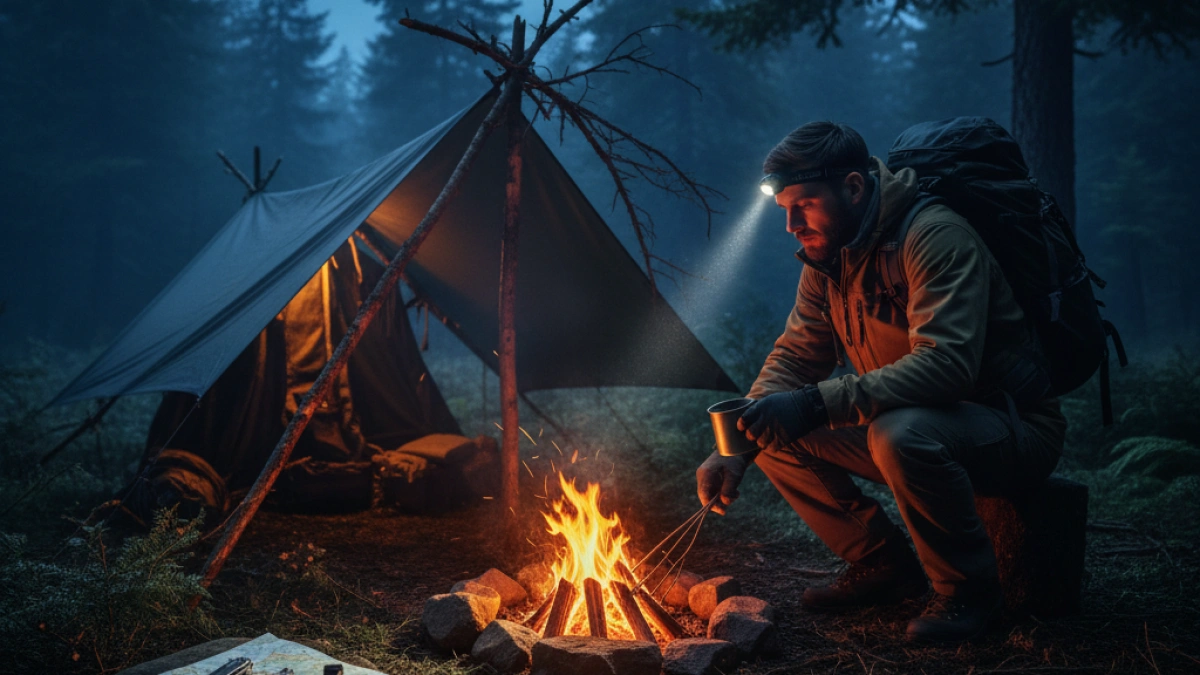10 Essential Tricks for Surviving a Night in the Mountains

Spending a night in the wilderness can be an unforgettable experience, but if the right precautions are not taken, it can turn into a real challenge. Whether you are an experienced adventurer or a beginner in camping, there is always room to learn new strategies that will make your adventure more comfortable and safe. Here are ten essential tips to ensure your outdoor stay is memorable.
1. Choose the Perfect Terrain
Selecting the right place to sleep is crucial for enjoying a good camping experience.
- It is advisable to look for an area that is as flat as possible; even a slight incline can be uncomfortable during the night.
- Once you find the appropriate spot, make sure to clear it well, removing branches, roots, and stones that might disturb you when lying down.
2. Watch Out for "Widow Makers"!
Safety should always be a priority when camping.
- Before setting up the tent, it’s essential to observe the surroundings, especially the sky. Avoid camping under old trees or thick, dry branches, known as "Widow Makers," which can fall with the wind and cause accidents.
- The presence of fallen wood nearby may indicate a dangerous area, so it’s better to choose a safer location.
3. Organize Your Space Inside and Outside the Tent
A well-organized space makes for greater comfort during your stay.
Read also
- If the tent has an exterior cover, use it to leave your backpack and boots, which will prevent dirt from getting inside. In case of rain, they can be wiped down before entering.
- Your backpack can serve as an improvised pillow while also protecting your belongings from moisture.
4. Keep Mosquitoes at Bay
Mosquitoes can be a significant nuisance, especially during warm seasons.
- If the regulations of the area allow it, creating a bit of smoke can be very effective; for example, burning pine needles or damp moss helps keep them away.
- Using repellent sprays is another option, although their effectiveness may vary and they can irritate the skin.
5. Comfort is Key: Pillow and Mat
A good rest is vital for enjoying camping.
- Consider bringing a pillow, and if it’s inflatable, even better, as they take up little space and significantly improve sleep quality. If you don’t have one, you can improvise with clothing or a scarf stuffed with dry leaves.
- It’s essential to use a mat, which acts as insulation from the cold ground. An inflatable mattress is another option that provides greater comfort, although it tends to be more expensive.
6. Check the Weather Forecast (Correctly!)
Preparing for the weather is a critical step to ensure a successful camping trip.
Read also
- Don’t rely solely on the weather forecast from nearby locations, as mountain weather can differ greatly.
- It is preferable to consult rain maps and specific forecasts for the area you’re heading to, as temperatures drop and the likelihood of rain or snow increases with altitude.
7. Tricks to Combat Nighttime Cold
Being cold can ruin the camping experience.
- Bring thick spare socks just for sleeping; cold feet are one of the main causes of restless sleep.
- A sleeping hat is very useful, as a large portion of body heat is lost through the head.
- Placing a water bottle filled with hot water in your sleeping bag is also an excellent trick to keep warm.
- Contrary to popular belief, it is advisable to sleep in thermal clothing inside your sleeping bag, as it provides an extra layer of insulation.
8. Keep Curious Animals at a Distance
Avoiding unexpected visits from wildlife is crucial for a good night’s sleep.
- Marking your territory, though it may sound strange, helps keep animals away, as their perceived scent can deter them.
- Furthermore, it is advisable not to cook near the tent; the smell of food attracts curious animals such as foxes, so meals should be prepared at least 100 to 200 meters away.
- Storing food in a bag hung from a tree will be effective in preventing animals from stealing it during the night.
9. Overcome the Fear of Nocturnal Noises
Nighttime sounds in the wilderness can be unsettling, amplifying even the smallest sounds.
- It’s helpful to have a headlamp available to quickly light up if you hear something strange.
- If the silence makes you anxious and hinders your sleep, bringing a radio or using your mobile phone can help distract you with familiar sounds.
- Earplugs are also an excellent choice for achieving restorative rest without distractions.
10. Know Camping Legislation
Being a responsible camper means being informed about local legislation.
- Before camping, it’s important to check the specific laws of the area. For example, in some countries like Spain, wild camping is restricted and generally not well-received by authorities, unless on private property or with permission.
- In high mountain areas, camping is often permitted, and the practice of "vivac" (sleeping outdoors) is accepted in most of these places.
- Practicing "Leave No Trace" is essential; camping can have a negative impact if not conducted respectfully. It is vital to leave the place as you found it to ensure a clean and safe environment for future campers.
With these fundamental tips, it will be possible to enjoy a comforting and memorable night in the wilderness. Happy camping!
For more information and tips, continue reading the blog.











































